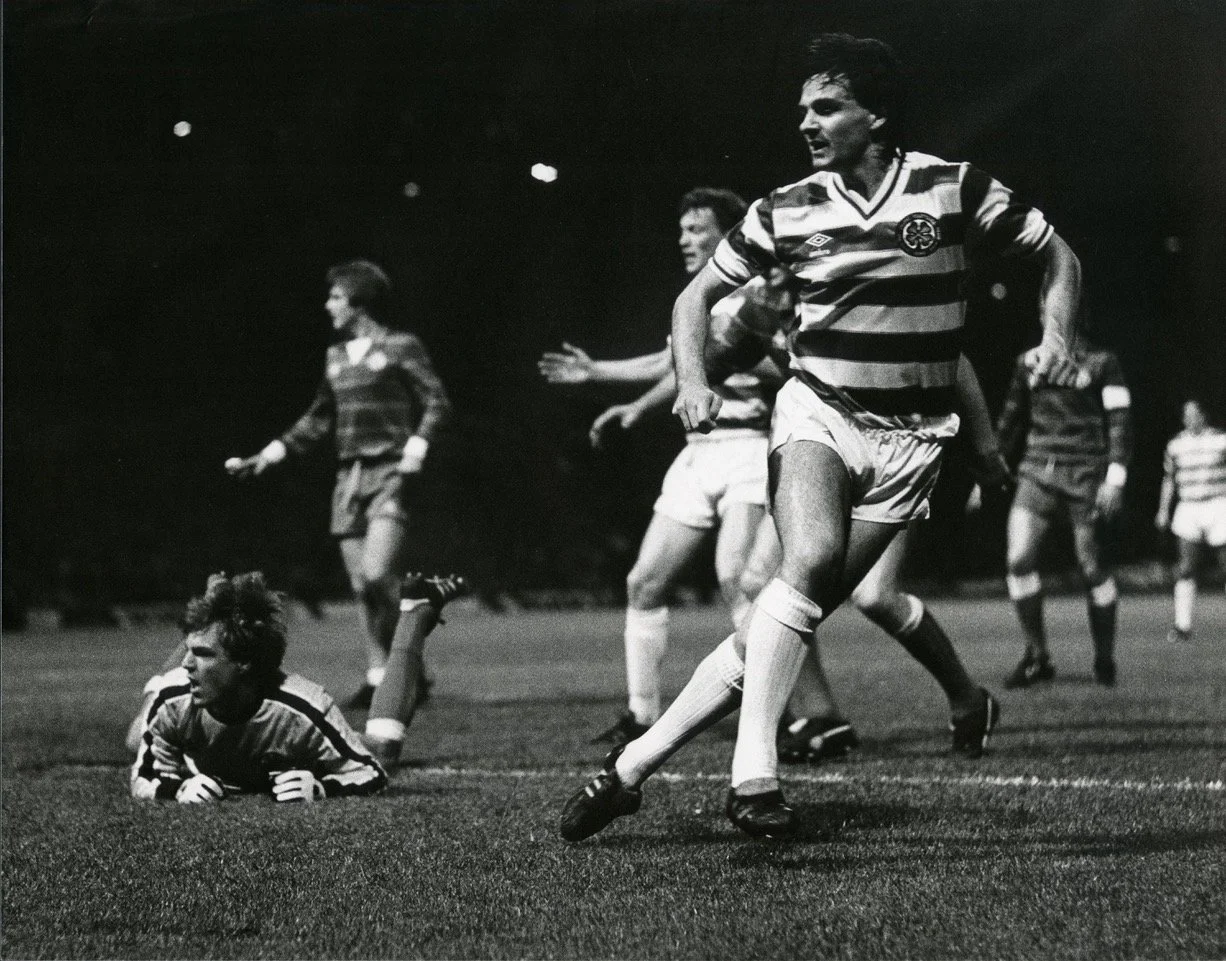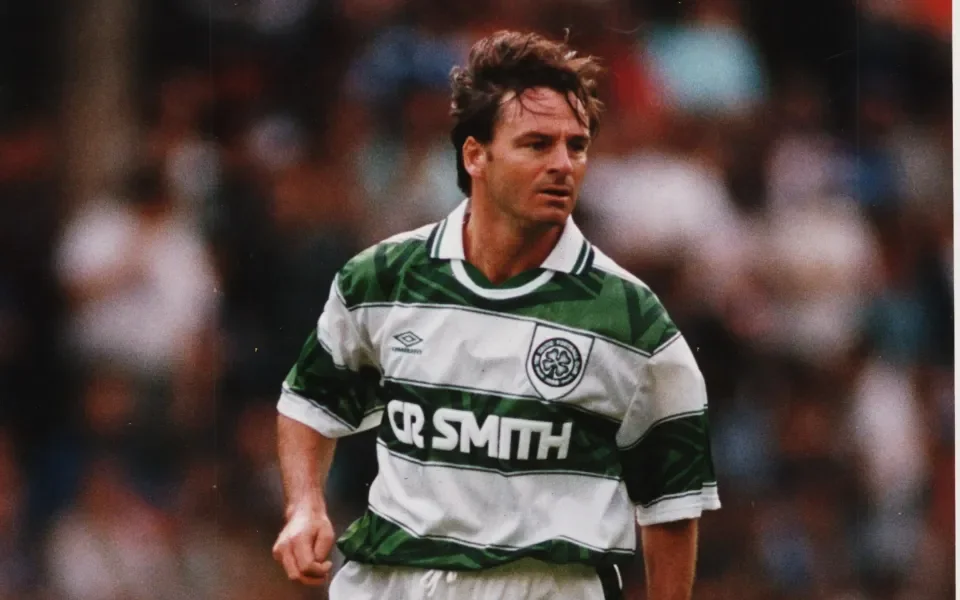Charlie Nicholas – ‘Charles de Goals’
“He should have gone to Liverpool, or stayed at Celtic” – what every football fan in England and Scotland said in 1988.
There are various accounts of how it all went wrong for Charlie Nicholas, after he left Celtic at the age of 21, in 1983. And these accounts will vary, according to the version you listen to. What everyone can agree on – Charlie included - is that for the sake of his football career, in hindsight, Charlie Nicholas made the wrong decision to join Arsenal.
Nicholas for Arsenal
Charlie Nicholas’s early career at Celtic is the classic tale of meteoric rise, devastating injury setback, and triumphant return. That 1980–81 season was remarkable for Charlie - 28 goals at just 19 years old, helping Celtic clinch the Scottish Premiership, and drawing comparisons to his idol Kenny Dalglish was no small feat.
But a broken leg – suffered in a friendly against Morton in January 1982 - was a disaster, especially coming at a time when he was being tipped for a place at the World Cup in Spain. However, you get an early glimpse of what made young Nicholas such a compelling force, is the way he responded. A refreshed, recuperated and a fully recovered Nicholas knocked in 48 goals and won all the personal awards going, in the 1982-83 season.
What a comeback, and at the age of 21 we all thought we were watching Scotland’s next great player. He even looked like Scotland’s best player back then, terrorising a league that bears no resemblance to what it is now. Back in 1983, Aberdeen won a Cup Winners Cup Final against Real Madrid – Alex Ferguson was at the height of his powers as a manager in Scotland. Back in 1983, despite all of Nicholas’ goals, Celtic were beaten to the title by Dundee United, who would go on to contest a European Cup semi-final the next season. And back in 1983, you would have said that he was a better footballer than Dalglish at 21 – that’s how good a player Charlie Nicholas was. And he ALWAYS scored against Rangers!
But as this huge world of opportunity opened up for him, an equally huge world of dilemmas presented themselves to Billy McNeill, his manager, and for the board at Celtic Football Club. Charlie was still dazzling on the pitch, but trouble was brewing off it.
The club claimed they were desperate to keep him – whilst secretly listening to offers for their soon-to-be-out-of-contract talisman. In those days, if the player was out of contract, the club could still demand a transfer fee, albeit a reduced one. The board at Celtic Football Club decided it was now or never to cash in on their star attraction.
South of the border, inevitably, Liverpool, Man United and Arsenal were all in the mix to sign him. Charlie had his choice of the top two teams in the country, but he still chose Arsenal. He does now regret the choice he made to join them, but it broke the poor guy’s heart to leave them in 1988. That’s what Arsenal still means to Charlie.
Nicholas says that the initial attraction to Arsenal in 1983 was coach Don Howe, and the way he constantly spoke of ‘The Arsenal’ to him. Charlie was soon wrapped up in the history of the club, and he “loved the red shirts with the white sleeves”. They were also promises of making other big signings, the likes of Liam Brady. And there was also the small matter of a £100,000 signing-on fee and £2,000 a week, to ultimately persuade him to sign for a team that had finished 10th in Division One, the previous season. That, and the luminescence of London, were enough to draw the sting away from his rejection of Liverpool.
Nicholas at the 1986 World Cup
All football fan ‘neutrals’ jeered, wishing nothing but the worst for Charlie Nicholas at Arsenal. Fans recall Arsenal’s last great experiment with ‘Scotland’s next superstar’, the ill-fated Peter Marinello, signed by Arsenal in 1970 for club-record fee of £100,000. Marinello left Highbury three seasons later, having scored five goals in 51 appearances. Those same fans were waiting for history to repeat itself.
And indeed, during his career at Arsenal, Charlie developed from a ‘goal-a-game’ unplayable striker at Celtic, to a ‘goal-every-four-games-Jock-misfit’ at Arsenal. All us neutrals cheered.
Looking for reasons as to how this happened, Charlie himself said that he missed the ‘father figure’ he had at Celtic, in the shape of Danny McGrain. At Arsenal, the older players all lived 20 miles away from the club, and had their own concerns, such as looking after their own young families. Charlie found himself a little restless, no guiding presence to warn or comfort.
The 21-year-old down from Glasgow, who looked like both Jim Kerr and Bono, reached for his leather trousers and decided to leave his flat. Just to see what London might offer him. Cue the cries of “London will swallow him”.
And, so, it did. Not spectacularly - Charlie was never a boozer to challenge the ‘Arsenal Class of the 90s’. But instead of resting in the evenings, he was often photographed, champagne glass in hand, surrounded by a procession of ‘Page-3 Stunners’ and singer/celebrities - who had set their early morning calls for 8pm - in various London nightclubs. Those distractions, added to a lack of supporting pastoral infrastructure at Arsenal, meant that Charlie Nicholas was doomed to fail in English football.
The ‘Arsenal Supporters Trust’ still awarded him with their ‘Player of the Season’ honour at the end of his first season in 1983-84. This, in no small part, as a thank-you to Charlie for scoring two goals at White Hart Lane on Boxing Day, as Arsenal won 4-2. The future looked so bold, after that particular game. And Gooners couldn’t help but love Charlie.
But they had to wait four seasons before he won his only honour in English football, a winners’ medal in the 1987 Littlewoods Cup Final. Charlie scored the two goals that defeated Liverpool that afternoon, having won his desperate battle to get fit for the final. Even then, every non-fan of Arsenal sneered. He scored with a one-and-a-half-yard tap-in and a wildly deflected shot that wrong-footed Grobbelaar.
And in between all of that time, Charlie did largely fail in English football. The late nights, ultimately, removed the gloss off one of the game’s great talents. The speed over five yards, the touch, gradually deserted him. Recovery from minor injuries took that much longer, defenders were rarely intimidated by his reputation.
By 1988, after a season and half under the tutelage of new Arsenal manager George Graham, he was back in Scotland, where he stayed for the rest of his career. First with Aberdeen – a snip at £400,00 - and then back to Celtic. He won a League Cup and a SFA Cup with Aberdeen, but nothing more with Celtic. He ended his footballing career with Clyde, retiring for good in 1996.
Charlie Nicholas’ football career is a story of unfulfilled talent. Probably, no one regrets that more than Charlie. No matter, Charlie still remains a very personable guy, the type of person you would readily spend time with, over a beer (not champagne). He excelled as a tv pundit, mainly because he has a genuinely warm and engaging personality. And you just know he loves and lives for his football.
We fans understand that there is a world of difference between the work ethic, talent and aspirational grasp of elite athletes, and the rest of the 99.9% of us poor sods, who need to work for a living. We also elevate these athletes, our heroes, to far higher levels. But we also understand that there is also one crucial similarity.
If any one of us office, factory, service or retail wallahs wish to better ourselves at work - to gain a promotion, to earn more money – we seek to increase our skills and experience. We attend courses, to learn new skills; we engage with new experiences to progress our career. We call this ‘professional development’.
But for many of us, we don’t bother; or we make the wrong calls to progress our careers - we don’t develop professionally. Charlie Nicholas, in 1983, did exactly what most of us do.
You could argue – Charlie would argue – that his professional development on the football pitch would have been held up at Liverpool, because Rush and Dalglish were in the queue just ahead of him. OK, so you wouldn’t want the chance to train with those two – and the rest of that team – because you might have to wait for your chance? A loss of form and injuries always play a part in a team’s season; especially, when one half of the pair is nearly 33 and is already being tapped up to take over as manager in the next few years.
Charlie Nicholas was that good at 21, that Liverpool may well have moved an ageing Dalglish into a new role behind a new strike pairing of Rush and Nicholas. That’s exactly what Liverpool had started to do by 1984-85 anyway, with the signings of Paul Walsh and Michael Robinson. And Charlie was a better player than those guys. Sadly, in 1983, Charlie said no to professional development, Liverpool-style.
His international career stalled abruptly, too, as Charlie moved to London. It was said that Scotland manager Jock Stein wouldn’t travel as far as London to watch any of his potential team play. Charlie’s international career was resurrected, however, after the untimely passing of Stein in 1985. Under new manager, Alex Ferguson, he played for Scotland in two matches at ‘Mexico ‘86’. But a meagre overall return of five goals in 20 games for Scotland, merely hint at what should have happened on the international stage for Charlie.
When we come to assessing Charlie Nicholas’ playing career, we should also consider that when Charlie was playing his football, footballers held the attitude – even the very best ones – that a career was short, and it could be taken away in an instant with a badly-timed or malicious tackle. Charlie had already suffered a broken leg at the age of 20, playing for Celtic in a friendly. Today’s vast riches were not on offer, back in 1983. Did Charlie just want to secure his financial future at a very early age, with a huge signing-on fee and weekly wage?
The final analysis tells us that Charlie should have taken a chance by signing for Liverpool. We would have loved to have seen a bit more of that utter jubilation in England, Charlie scoring goals and winning trophies. Watching Charlie and his knees, thighs, arms pumping, celebrating a goal for Celtic was joyous – we knew just what it meant to him.
And, Charlie Nicholas, despite the unfulfilled football career, shared his great joy with us. He also showed us that he was human, like us, and that he could make wrong decisions, just like us.
And, therein, lies Charlie’s great appeal.
Despite being a wonderful footballer, Charlie Nicholas was also sprinkled with a stellar dusting of ‘the everyman’.




